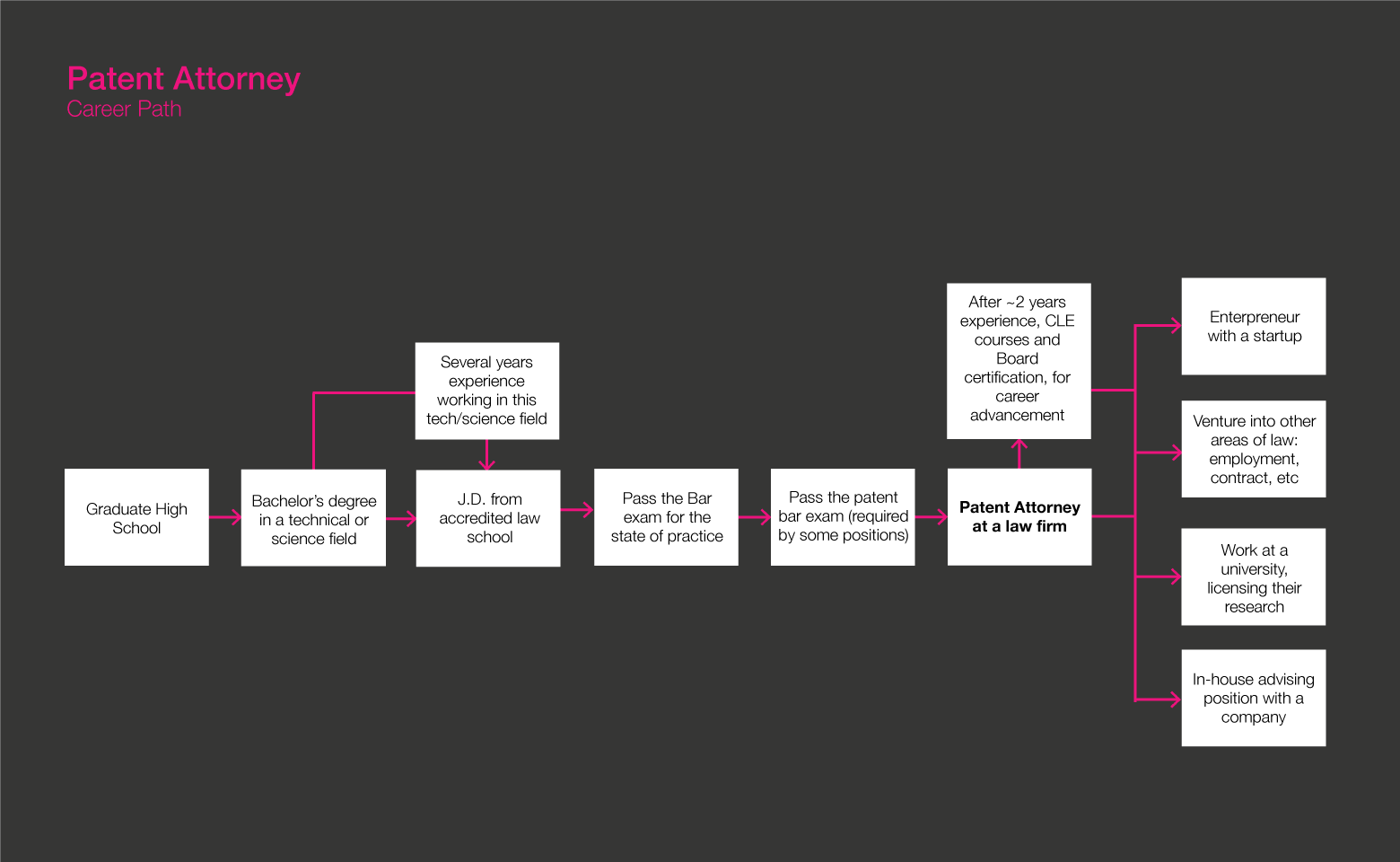Focos
Títulos similares
Abogado de patentes, Fiscal de patentes, Litigante de patentes, Asesor de propiedad intelectual, Consultor de patentes, Abogado de cartera de patentes, Abogado de tecnología, Abogado de innovación, Especialista en patentes, Gestor de derechos de patentes
Descripción del puesto
Los abogados de patentes obtienen y/o renuevan patentes en nombre de inventores y empresas. También asesoran y representan a clientes en cuestiones de infracción de patentes y otros ámbitos relacionados con los derechos de propiedad intelectual.
Aspectos gratificantes de la carrera profesional
- Trabajar con inventores motivados e inspiradores
- Ser una parte crucial del proceso de innovación
- Trabajo muy estimulante intelectualmente
- Ver los productos del futuro antes que la mayoría del público
La primicia
Responsabilidades laborales
- Al solicitar patentes:
- Llevar a cabo una investigación para asegurarse de que la invención en cuestión no está ya patentada por otro inventor, así como verificar la exactitud científica y jurídica de las reivindicaciones del inventor.
- Redactar, presentar y remitir solicitudes de patente a la Oficina de Patentes y Marcas de Estados Unidos (USPTO).
- Además de presentar solicitudes, los abogados de patentes:
- Licenciar la patente a otras empresas, una vez aprobada por la USPTO.
- Representar a clientes en casos de infracción de patentes
Habilidades necesarias
Habilidades sociales
- Habilidades interpersonales: comunicarse eficazmente y establecer una sólida relación profesional con el cliente.
- Capacidad de organización y gestión del tiempo
Competencias técnicas
- Capacidad analítica: analizar grandes cantidades de información de forma rápida y eficaz.
- Capacidad de resolución de problemas
- Capacidad de investigación
- Capacidad de expresión oral y escrita
- Conocimientos científicos y técnicos amplios y actuales
- Conocimientos informáticos
Diferentes tipos de organizaciones
- Despachos de abogados (lugar de trabajo más frecuente)
- Asesoramiento a empresas y/o universidades
- Oficina de Patentes y Marcas de los Estados Unidos
Expectativas/Sacrificios necesarios
- Trabajar muchas horas para perfeccionar el oficio
- Años de educación y formación que requieren un compromiso significativo
- Preprofesional, con un puesto de aprendiz de 1-2 años que implica muchas horas de trabajo y un salario inicial relativamente más bajo.
Tendencias actuales del sector
- Experiencia en un campo STEM
- Dominio t de la tecnología, es decir, el lenguaje de la ciencia y las matemáticas.
- Mantenerse al día sobre las tendencias del Derecho y la tecnología
- Las redes sociales y la digitalización se están generalizando en el sector jurídico
- Por ejemplo, los bufetes de abogados sincronizarán sus datos con la nube para prescindir del papel, acceder a herramientas de búsqueda más potentes, etc. Además, los abogados deben tener mucho cuidado con lo que publican en las redes sociales.
¿Qué tipo de cosas le gustaba hacer a la gente de esta carrera cuando eran jóvenes...
- Afición por el bricolaje en el instituto, que dio lugar al aspecto técnico de su formación.
- La pasión por la lectura y la escritura suele conducir a la carrera jurídica
- Amor por aprender
- Necesidad de abordar temas innovadores y familiarizarse con ellos en poco tiempo.
Educación y formación necesarias
- Los abogados de patentes son abogados especializados en propiedad intelectual. A menudo obtienen una licenciatura en un campo de la ciencia o la tecnología antes de ir a la escuela de leyes para obtener su JD (Juris Doctor).
- Antes de solicitar el ingreso en la Facultad de Derecho, los aspirantes a abogado deben realizar el Examen de Admisión a la Facultad de Derecho (LSAT), a menos que la facultad acepte los resultados del Graduate Record Examinations (GRE).
- El LSAT es un examen en línea, a distancia, que consiste en preguntas de opción múltiple en las áreas de comprensión lectora, razonamiento analítico y razonamiento lógico. También hay una parte de ensayo escrito
- Un escuela de derecho aprobada por la American Bar Association puede durar 3 años si se cursa a tiempo completo y hasta 5 si se cursa a tiempo parcial
- Todos los licenciados deben realizar el llamado examen. Cada Estado tiene sus propias normas para esta prueba de dos días. La Conferencia Nacional de Examinadores de la Abogacía ofrece detalles
- En Examen de acceso a la abogacía en varios estados dura 6 horas y tiene 200 preguntas
- Los Estados podrán solicitar además las puntuaciones del Examen multiestatal de redacción y Prueba de rendimiento multiestatal
- Algunos estados aceptan el Examen Uniforme de la Abogacíacompuesto por el Multistate Essay Examination, el Multistate Performance Test y el Multistate Bar Examination
- La mayoría de los estados también exigen aprobar el Examen multiestatal de responsabilidad profesional
- Además de aprobar el examen de acceso a la abogacía, los abogados de patentes también deben aprobar un examen de inscripción para "representar a clientes ante la Oficina de Patentes y Marcas de EE.UU.", per Investopedia
- El examen de patentes consta de 100 preguntas de opción múltiple y se realiza mediante un sistema informático (aunque la USPTO ofrece ocasionalmente exámenes presenciales en su oficina de Virginia).
- Tenga en cuenta que se trata de un examen muy difícil, con una tasa de aprobados inferior al 50%. de aprobados en los últimos años.
- La USPTO ofrece un tutorial para ayudar a los examinandos a saber qué esperar
- Los abogados de patentes también pueden tener que seguir cursos de formación jurídica continua.
- Tras unos años de experiencia laboral, los abogados pueden solicitar varias certificaciones para mejorar sus credenciales.
Promoción profesional
- Se les anima a seguir los cursos CLE (Continuing Legal Education) de Derecho de patentes, que suelen ofrecer los colegios de abogados estatales, así como la American Bar Association.
- Certificaciones ofrecidas por colegios de abogados estatales y otras organizaciones profesionales, y suelen requerir algunos años de experiencia como abogado de patentes.
- Afiliarse a organizaciones profesionales o participar en seminarios relacionados con su campo de especialización.
- Algunos enlaces a organizaciones de derecho de patentes:
Cosas que hacer durante el instituto/universidad
- En el instituto, perfecciona tu expresión oral y escrita y participa en actividades que ofrezcan experiencias de liderazgo o gestión.
- Prepararse para la universidad con un montón de clases de STEM, así como el habla, Inglés comp, debate, filosofía, psicología, ética, y los negocios
- Participar en clubes y actividades relacionados con STEM y conocer los derechos de propiedad intelectual.
- Mientras haces la licenciatura, prepárate para el doctorado cursando ciencias políticas, historia, derecho, inglés o materias afines.
- Busca oportunidades para perfeccionar tus dotes de oratoria y tu poder de persuasión.
- Decida si puede asistir a tiempo completo o tendrá que hacerlo a tiempo parcial debido a su trabajo u otros compromisos.
- Considere qué método de aprendizaje le conviene más: presencial, en línea o híbrido. Todas las opciones tienen sus pros y sus contras.
- Únase a organizaciones profesionales como Phi Alpha Delta o clubes de estudiantes que te ayuden a aprender y a establecer contactos
- Busca prácticas que puedan convertirse en puestos de trabajo algún día, si juegas bien tus cartas.
- Colabora estrechamente con tus asesores académicos para mantenerte en el buen camino y graduarte a tiempo.
- Estudia mucho para todas las clases, así como para exámenes como el LSAT, el examen de abogacía o el examen de registro de la USPTO.
Hoja de ruta típica

Cómo conseguir tu primer empleo
- Busque activamente un programa de aprendizaje o asociación de verano con un bufete de abogados o una empresa STEM durante sus estudios de Derecho; a menudo, esta experiencia puede traducirse en un empleo en el bufete o la empresa tras la graduación.
- Trabaja con el programa o el centro de orientación profesional de tu facultad para localizar y solicitar puestos de trabajo. Muchas facultades colaboran estrechamente con bufetes de abogados que contratan a licenciados.
- Asista a las ferias de empleo, a la oficina de empleo, a los reclutadores en el campus, etc., que se ofrecen en la facultad de Derecho.
- Rendir al máximo durante las prácticas. A veces se ofrecen puestos a los becarios si se gradúan y aprueban el examen de acceso a la abogacía.
- Aunque no te contraten, sus referencias pueden marcar la diferencia.
- Comunica a tu red con antelación cuándo te vas a graduar y el plazo en el que quieres empezar a trabajar.
- Publica tu currículum en portales de empleo como Indeed, Glassdoory Martindale
- Asegúrese de que su currículum es impactante, convincente y no contiene errores. Piense en él como una muestra de trabajo, un anticipo del tipo de atención al detalle que presta a sus escritos.
- Echa un vistazo a New England Law's Cómo redactar tu currículum para la Facultad de Derecho sin experiencia jurídica
- Solicitar la aprobación previa de los profesores y supervisores pertinentes para incluirlos como referencias u obtener cartas de recomendación de ellos.
- Perfecciona tus habilidades para la entrevista revisando Preguntas de entrevista de la Facultad de Derecho de Harvard
- Lea noticias sobre la industria de patentes. Esté preparado para comentar las tendencias y los cambios durante las entrevistas.
- Practique simulacros de entrevistas para mostrarte capaz y seguro de ti mismo
Lo que realmente se necesita para triunfar
- El éxito en este campo requiere una verdadera pasión por aprender trabajando con inventores que le enseñarán los últimos y mejores proyectos en los que están trabajando.
- Comprender cómo encaja la herramienta comercial en el valor global para una empresa
Cómo encontrar un mentor
- Utiliza los motores de búsqueda para encontrar despachos de abogados y empresas que operen en los ámbitos que te apasionan.
- Los nombres de los profesionales que trabajan en estas organizaciones suelen publicarse con su información de contacto
- Ponte en contacto con estos profesionales y comprueba si están dispuestos a dedicarte sólo un par de minutos para hablar de su carrera.
Recursos recomendados
Páginas web
- Asociación Americana de Abogados
- Asociación Americana del Derecho de la Propiedad Intelectual
- Asociación de Asesores de Patentes de Empresa
- Asociación de Institutos Nacionales de Abogados de Propiedad Intelectual
- IPWatchdog
- Consejo de Admisión de Facultades de Derecho
- Asociación Nacional de Colocación de Abogados
- Asociación Nacional de Profesionales de Patentes
- Conferencia Nacional de Examinadores de la Abogacía
- Patently-O
- Phi Alpha Delta
- Colegio de Abogados PTAB
Libros
- Derecho de patentes estadounidense: A Business and Economic History, por Robert P. Merges
- Derecho de patentes: Casos, problemas y materiales, por Jonathan S. Masur y Lisa Larrimore Ouellette
- Derecho y política de patentes: Cases and Materials, por Robert Merges y John Duffy
- Fundamentos del Derecho de Patentes: A Concise Guide, por Alan L. Durham
Plan B
- Empresario (por ejemplo, con una startup)
- Derecho laboral y contractual
- Trabajar dentro de una universidad en la concesión de licencias de la tecnología desarrollada, en lugar de en la adquisición de las patentes.
- A Un puesto interno en una empresa para asesorar directamente a los responsables de la toma de decisiones sobre las medidas a adoptar en materia de protección de la propiedad intelectual.
Noticias

Ofertas de empleo

Cursos y herramientas en línea







